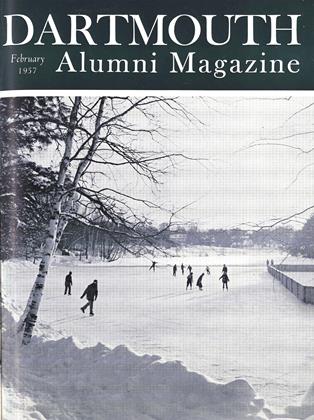Under the chairmanship of Dudley B. Bonsai '27, a special committee of the New York City Bar Association released in July a widely studied report 011 the Federal Loyalty-Security Program. While emphasizing the necessity for national personnel security, his committee warned that individual liberty must also be guarded. "Liberty is a quality to which this nation since its foundation has been devoted and which it has cherished. To ignore or even to slight liberty would be to destroy our character as a people and as a nation."
The group found four weaknesses in the federal program: a lack of coordination between its several sections; the overly broad scope of the personnel positions listed; the inelasticity in judging varying cases; and the lack of protection the program provides in the interests of government and employees. The committee advised fewer government screenings and urged due-process of law reforms in the federal civilian security risk program.
Mr. Bonsai has had ample experience working on problems of the individual's security here and abroad. In 1952 he was one of a congress of lawyers from 43 countries studying Communist perversions of law in East Germany. During the war he was chief counsel in the Office of InterAmerican Affairs, Washington, D. C., and followed that job by attending the InterAinerican Conference on Problems of War and Peace, held in Mexico City in 1945. In addition he was legal adviser to foreign bondholders at a conference on German debts held in London in 1951. Experienced in international law, he has served three years as chairman of the New York City Bar Association's Committee of Foreign Law and is a member of both the American Foreign Law Association and the Executive Committee of the International Commission of Jurists, The Hague.
Mr. Bonsai was graduated from the Harvard Law School in 1930 and has been a partner of Curtis, Mallet-Prevost, Colt & Mosle, New York City, since 1938.
 View Full Issue
View Full Issue
More From This Issue
-
 Feature
FeatureSoldiers As Policy Makers
February 1957 By JOHN HURD '21 -
 Feature
FeatureBuilding for Today—and 1969
February 1957 By PROF. JOHN P. AMSDEN '20, -
 Feature
FeatureA Running Start
February 1957 -
 Feature
FeatureTo Make What's Good Better
February 1957 By R. L. A. -
 Class Notes
Class Notes1918
February 1957 By ERNEST H. EARLEY, W. CURTIS GLOVER, RICHARD P. WHITE -
 Class Notes
Class Notes1926
February 1957 By HERBERT H. HARWOOD, H. DONALD NORSTRAND
Article
-
 Article
ArticleCAMPUS NOTES
March, 1922 -
 Article
ArticleNew Year's Greetings From A.I.D.
February 1943 -
 Article
ArticleG.E. Presents Computer
NOVEMBER 1969 -
 Article
ArticleVARSITY SCHEDULES
DECEMBER 1967 By ALBERT C. JONES '66 -
 Article
ArticleFrom 1968 to 1985: A long-term Dartmouth plan
NOVEMBER • 1985 By Alex Huppe -
 Article
ArticleWith the Outing Club
March 1931 By William B. Rotch ’37

